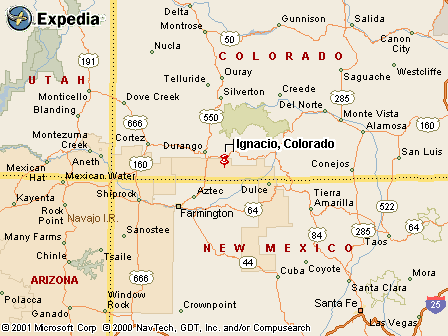|
|
Canku Ota |
|
|
(Many Paths) |
||
|
An Online Newsletter Celebrating Native America |
||
|
June 15, 2002 - Issue 63 |
||
|
|
||
|
Tribal Elders Carry on Old Ways |
||
|
by Matt Joyce Durango
Herald Staff Writer
|
||
|
credits: Bennett
Thompson, a member of the Southern Ute Committee of Elders, recently
showed some jewelry he crafted in a work room at his Ignacio home.
|
|
"I tell you what, I do more work now that I'm retired," said Thompson, a 66-year-old Southern Ute and a member of the Southern Ute Committee of Elders. "I never thought I'd be an elder." Thompson is one of 119 Southern Ute Indian tribal members older than 59; his generation makes up 8.6 percent of the tribe's population of 1,378 members. The Southern Ute Tribal Council formed the Committee of Elders in 1980 to tap the resources of tribal elders and institutionalize a traditional respect for elders. Committee members, who meet twice monthly at the Southern Ute Senior Center, say they play an advisory role for the tribal government, paying particular attention to senior issues, natural resources and the importance of tribal traditions. Many of the members, like Thompson, also incorporate tribal traditions of the arts, spirituality and family into their daily lives. Sunshine Smith, 85, is thought to be the third-oldest tribal member living on the reservation. A member of the elder committee, she said it's been difficult to maintain traditions as tribal members' interests diversify. "We're supposed to work with the rest of the people to try to preserve the old ways, the Bear Dance, Sun Dance, War Dance – to keep it going," Smith said in an interview at her home, which sits on land allotted to her family by the federal government in 1895. "You've got to hang on to something – some belief – so you can still be a part of the tribe." Smith was born Sunshine Cloud in 1916. She learned the Ute language as a child and picked up English as she grew older. As a child, she would walk or ride her horse to a one-room schoolhouse on the Buck Highway (County Road 521). She served on the Tribal Council – the tribe's seven-member governing body – in the transitional 1950s, when the Southern Utes, Ute Mountain Utes and Northern Utes successfully won $32 million from the federal government in claims lost through treaties and land deals. The Southern Utes designed a rehabilitation plan to develop the reservation with the money. Some of the measures were unpopular at the time, Smith said. "We had to plan and improve our homeland situation," she said, which brought changes to the Utes' lifestyle. "I deeply felt that we had to make our reservation a better place to live. We had to keep up with the outside changes somehow, to fit our reservation land." Marvin Cook, executive officer for the tribe, said the elders committee often deals with cultural issues, serving as advisers for traditional events, such as the Bear Dance or Sun Dance. The committee also serves as advocates for fellow tribal elders and members with disabilities. "Primarily, they fall under the Tribal Council," he said. "They report directly to the Tribal Council." Annabelle Eagle, 77, said she became involved with the elders committee because she was interested in issues facing the tribe. "We decide who we want in the (tribal government departments) to come down and do a presentation, or else they ask," she said. "It's all a matter of keeping us informed and getting our blessing if they're doing it right." She said the Tribal Council pays only nominal attention to the elders committee – a trend she believes is reflected in family relations throughout the tribe. "The people have lost so many of their tribal elders that something is gone – that cohesiveness among families. We're worlds apart now," she said. "That's the biggest change that ever occurred to our people." Eagle said she and her husband, Clifford, have tried to impress upon their children the importance of family ties. During an interview on her front porch, the Eagles' grandchildren and great-grandchildren pay visits, and the couple speaks in Ute. "That was the old tradition; you had to know who your relatives are," she said. "I talk to a lot of people and ask them who their relatives are, and they don't know. They don't know their cousins, their grand-aunts. It's a pity."
|
|
|
||
|
|
||
| Canku Ota is a free Newsletter celebrating Native America, its traditions and accomplishments . We do not provide subscriber or visitor names to anyone. Some articles presented in Canku Ota may contain copyright material. We have received appropriate permissions for republishing any articles. Material appearing here is distributed without profit or monetary gain to those who have expressed an interest. This is in accordance with Title 17 U.S.C. section 107. | ||
|
Canku Ota is a copyright © 2000, 2001, 2002 of Vicki Lockard and Paul Barry. |
||
|
|
|
|
|
The "Canku Ota - A Newsletter Celebrating Native America" web site and its design is the |
||
|
Copyright © 1999, 2000, 2001, 2002 of Paul C. Barry. |
||
|
All Rights Reserved. |
||

 IGNACIO,
CO - Bennett Thompson reaches to shelves in a small workroom of his
house and pulls out his arts and crafts projects – works of beads,
silver and wood; pelts waiting for the perfect use.
IGNACIO,
CO - Bennett Thompson reaches to shelves in a small workroom of his
house and pulls out his arts and crafts projects – works of beads,
silver and wood; pelts waiting for the perfect use.
